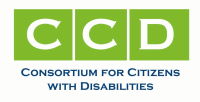National Senior and Disability Advocates Agree on Principles for Financing Long-Term Services and Supports
November 20, 2008


Contacts: Annie Acosta, CCD: 202-783-2229
Marcie Kohenak, LCAO: 202-637-5178
November 20, Washington, D.C. - In a historic step toward a healthier, more equitable and affordable system for financing long-term services and supports, the Leadership Council of Aging Organizations (LCAO) and the Consortium for Citizens with Disabilities (CCD) have agreed on a set of joint principles for reform.
Together, the two coalitions represent over 150 organizations representing seniors, people with disabilities, and providers of health, housing and supportive services. Their consensus on a new direction for financing these services puts millions of Americans behind the push for reform.
"Individuals and families should not be forced to impoverish themselves to cover the costs of services they or their family members need in the event of disability or advancing age," Marty Ford, CCD Chair and Director of Legal Advocacy for The Arc and UCP Disability Policy Collaboration, said. "Every family faces these potential costs, and we need to reform the system to support families and keep those in need at home and in their communities."
"Long-term services and supports put enormous strain on both families and government, and we must devise a solution before our fragmented system crumbles under the weight of the baby boom generation," said Edward Coyle, Chair of LCAO and Executive Director of the Alliance for Retired Americans.
An estimated 10 million Americans currently have needs for long-term services. The number of individuals needing long-term services is projected to increase to 26 million by 2050. However, the nation lacks a coordinated, national public-private system for delivering long-term services and supports. Nearly half of all funding for these services is now provided through Medicaid, which is a growing burden on states and requires individuals to become and remain poor to receive the help they need. There is also an institutional bias in Medicaid whereby approximately two-thirds of all spending is directed towards nursing homes and other institutions instead of preferred community-based services and supports.
The principles adopted by the two coalitions call for a national solution. The plan should give consumers access to a broad array of support options, including a continuum of home and community-based supportive services. The new public financing system should be as universal as possible with a limited choice to opt out. This new system will relieve pressure on Medicaid. The new system should promote independence and dignity across the lifespan by ensuring beneficiaries the right to control and choose what services they receive, how and where they are delivered, and who provides them.
We urge members of Congress to introduce legislation that is consistent with these principles. For example, legislation introduced by Senator Ted Kennedy and Rep. Frank Pallone, and supported by President-Elect Barack Obama, is compatible with the LCAO-CCD principles. The legislation is the Community Living Assistance Services and Supports Act, or CLASS Act.
Long-term services and supports are essential to the health and economic well-being of millions of Americans. The CCD and LCAO principles provide the next Administration and Congress with a blueprint for inclusion of long-term care within the broader health care reform discussion.
The principles are:
•1. National Problem, National Solution - Recognize that although states, communities, families, and individuals have important roles to play, financing for long-term services and supports is a national problem that requires a national solution.
•2. Universality with Limited Opt-Out - Create a public program that allows all people, including individuals with disabilities and those near retirement, the opportunity to contribute to and prepare for the costs of long-term services and supports. Make participation as convenient as possible but give people the limited choice to opt out.
•3. Public/Private Partnership - Provide a strong foundation of protection while providing opportunities for personal planning that include a role for private sector options.
•4. Affordability and Risk Pooling - Provide for broad pooling of risk and appropriate low-income subsidies to make premiums affordable enough so that all people, regardless of income and health status, can participate. Ensure that a new program does not force people to impoverish themselves to qualify.
•5. Fiscal Responsibility - Provide actuarially sound funding, such as through voluntary premiums that build reserves over time sufficient to pay for future needs in a way that is affordable to individuals and to society as a whole.
•6. Relieve Pressure on Medicaid - Provide additional long-term services and supports funding mechanisms that will help take the pressure off of future Medicaid expenditures, while preserving the guaranteed safety net.
•7. Consumer Choice and Control - Promote independence and dignity across the broad continuum of services and supports by ensuring beneficiaries the right to control and choose what services they receive, how and where they are delivered and who provides them.
•8. Support Family Caregivers - Recognize and support the central role families and other informal caregivers play in planning for and providing long-term services and supports, including developing strategies to support working caregivers to maintain their financial security.
•9. Invest in Quality Care and Quality of Life -Target additional funding to ensure sufficient training and compensation for the workforce and to strengthen oversight, enforcement, and advocacy programs that improve quality of life and quality of care in all settings.
###
About CCD (http://www.c-c-d.org)
The Consortium for Citizens with Disabilities is a coalition of approximately 100 national disability organizations working together to advocate for national public policy that ensures the self determination, independence, empowerment, integration and inclusion of children and adults with disabilities in all aspects of society
About LCAO (http://www.lcao.org)
The Leadership Council of Aging Organizations (LCAO) is a coalition of national nonprofit organizations concerned with the well-being of America's older population and committed to representing their interest in the policy-making arena. The 56 members offer expertise and advocacy on a broad range of issues affecting the elderly and those who care for them. The coalition focuses on ensuring social justice and fiscal responsibility for an aging society.







